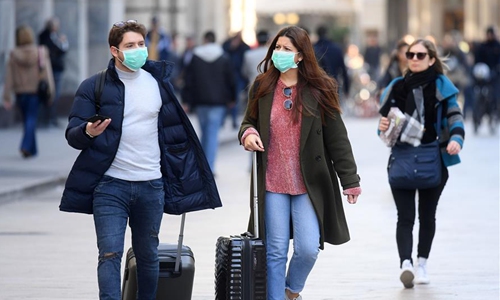HOME >> WORLD
Chinese people in Italy concerned over lax measures against COVID-19 epidemic
By GT Staff Reporters Source:Global Times Published: 2020/2/28 18:52:36

Photo:Xinhua
Panic and insecurity are haunting some Chinese people in Italy as the COVID-19 outbreak has become more severe in the past week, and the local governments do not take effective measures which leads to local people not paying enough attention to the risk.
On Friday, the number of confirmed infected cases of COVID-19 had surged to 650, with a death toll of 17. Twelve towns in northern Italy have been locked down.
The virus continues to spread in Europe.
However, the Italian government has been trying to reduce the panic over the virus. Italian Prime Minister Conte told the national broadcaster Rai to "tone down." "It's time to stop the panic," he said, the BBC reported Thursday.
The mayor of Milan has called for closed museums to reopen, the BBC reported, even though the Lombardy region is suffering from a severe epidemic and half of the hotels and restaurants are closed in Milan.
Chinese people living in Italy, who have been witnessing the horrible scenes of the epidemic back in China, expressed their disappointment and shock to the Global Times.
"People just think it is a severe kind of flu," Jenny Hu, a resident of Milan from China, told the Global Times on Friday. Schools are suspended here this week, but work continues as usual.
"I cannot say that I am confident about the medical and supply systems here," she said, adding that many Chinese people want to go back to China.
Hu asked her Italian husband to wear a mask, who found he is always the only one wearing a mask wherever he goes. "From government to experts of all levels, they just promote that you only need to wear a mask if you are infected or stayed with the infected patients."
Hu also noted that some Italians blame China, which has led to discrimination against Chinese.
By Thursday afternoon, only about 250 infected patients in Italy were in the hospital, with 284 in home isolation, NPR said.
A Chinese university student in Siena expressed his disappointment about the situation in Italy on Friday on his WeChat. He refused to be fully named.
"Wearing a mask here, people would still think you are sick and you would be talked about and discriminated," he said, adding that he felt the Italian government is giving up disease prevention measures by reopening the closed public facilities.
Classes have not been suspended yet, which worries him a lot. "I told a professor that it is risky for people gathering for a lecture, and he told me to eat more oranges to enhance my immunity."
Li Xinzhu returned to China on Tuesday, two weeks before her original plan due to the COVID-19 outbreak in Italy.
She said she is confident in Italy's level of medical expertise and scientific research. However, she believes the European country does not have sufficient emergency reserve supplies, and local residents have not paid enough attention to the COVID-19 risks.
As a graduate music student in Bologna in northern Italy, Li had planned to obtain her certification and stay in the country through mid-March.
Li returned home because she was worried about the availability of supplies in Italy. "Most Chinese students there could not buy masks anywhere," she said, who gave her remaining face masks to one of her teachers.
Now that she is home in Northeast China's Liaoning Province, Li said she feels safe.
"I have confidence in China. China has experience and medical supplies. At home I would have enough food," she said.
Posted in: EUROPE